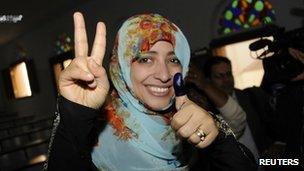New Yemen President Abdrabbuh Mansour Hadi takes oath
- Published
In a televised ceremony, Mr Hadi pledged to continue Yemen's fight against al-Qaeda
Yemen's new President Abdrabbuh Mansour Hadi has taken the oath of office, hours after his predecessor Ali Abdullah Saleh returned to country.
Mr Hadi was elected in a single-candidate poll on Tuesday, which was marred by violence in the south of the country, in which nine people died.
The election followed a deal brokered by Yemen's neighbours after months of protests against Mr Saleh's rule.
A car bomb went off in the south as Mr Hadi was being sworn in, say reports.
Reports say at least seven people were injured when the vehicle was blown up at the gates of a presidential palace in Hadramawt province.
Mr Saleh will formally hand over power in a ceremony on Monday.
He returned to the country earlier on Saturday after having received medical treatment in the United States for injuries sustained in an assassination attempt last June.
The controversial deal to transfer power gives Mr Saleh, who had been in power since 1978, immunity from prosecution.
In a ceremony in parliament broadcast live by state television, Mr Hadi pledged to "preserve the country's unity, independence and territorial integrity", the AFP news agency reports.
He also promised to work to bring home the thousands of internal refugees created by fighting between government troops, southern separatists, mutinous military units, and other factions.
"One of the most prominent tasks is the continuation of war against al-Qaida as a religious and national duty, and to bring back displaced people to their villages and towns," Mr Hadi said.
He is due to stay in office for two years, when a further round of presidential and parliamentary elections are scheduled.
Challenges ahead
Yemen's election commission said the turnout in Tuesday's poll was 65%.

Nobel Peace Prize winner Tawakkol Karman was among those who turned out to vote
More than 99% of the 6.6m votes cast were for Mr Hadi, the commission said. The only option on the ballot was to vote for Mr Hadi.
At least nine people, including a child, were killed on the day of the poll. The violence had been widely expected after separatists in the south of the country called on voters not to take part.
Shia rebels in the north had also called for a boycott.
The main supporters of the uprising that began in January 2011 had backed Mr Hadi, whose election posters were prominently displayed in Sanaa.
He is from the south himself and has called for dialogue with the separatists.
He now faces the task of dealing with Yemen's many challenges - an ongoing rebellion in large parts of the country, al-Qaeda militants, widespread malnutrition among children and severe drought.